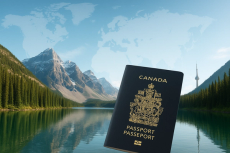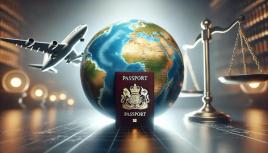Blog • Published on:September 1, 2025 | Updated on:September 18, 2025 • 8 Min
Complete List of Egypt Visa-Free, Visa-on-Arrival, and eVisa Countries in 2025
In 2025, Egyptian passport holders can travel to 109 countries without needing a traditional visa. This includes 19 countries offering visa-free access, 27 providing visas on arrival, and 45 requiring an eVisa.
Overview of Egypt Visa-Free Travel Privileges
What kind of destinations are included in these 109 countries?
- Regional allies like Jordan and Lebanon offer simple, open access for Egyptian citizens.
- Popular holiday destinations like Indonesia, the Maldives, and Sri Lanka are available through visa-on-arrival or quick eVisa processes.
- Important business and transit hubs like Singapore and the UAE allow entry via eVisa.
What does this mean for travel planning?
For Egyptian travellers, this mix of visa-free, visa-on-arrival, and eVisa access means smoother international mobility.
While traditional visa applications for places like the US, UK, or Schengen countries still require planning, over 100 countries are within reach with minimal paperwork.
Complete List of Visa-Free Countries for Egyptians
What countries can Egyptian passport holders enter without a visa in 2025?
Visa-free means no forms to fill, no online applications, no airport queues for visa stamps, just pack your bag, book a flight, and go. In 2025, Egyptian citizens can visit 19 countries without needing a visa at all.
Key Takeaways:
- No application needed: You don’t need to fill out forms or visit embassies.
- Entry requirements still apply: While visas aren’t needed, some countries still ask for proof of accommodation, return ticket, or funds.
- Duration limits vary: Some allow 30 days, others up to 90 days. Always check before booking.
Countries Offering Visa on Arrival for Egyptian Citizens
Which countries grant visa on arrival to Egyptian passport holders in 2025?
In 2025, Egyptian citizens can obtain a visa on arrival in 27 countries, spanning various regions. This means travellers can receive their visa upon entering the country, typically at the airport or border crossing, without prior application.
Key Points to Remember:
- Visa on arrival allows travellers to obtain a visa upon entering the destination country, usually at the airport or border crossing.
- Stay durations vary by country; it's essential to check the specific duration allowed for each destination.
- Requirements may include a valid passport, return ticket, proof of accommodation, and sufficient funds.
This visa on arrival access provides Egyptian travellers with flexibility and ease when planning trips to these countries.
EVisa Requirements for Egyptian Passport Holders
What is an eVisa, and how does it benefit Egyptian travellers in 2025?
An eVisa, or electronic visa, is a digital travel authorization obtained online before departure. For Egyptian passport holders in 2025, eVisas simplify the visa application process, eliminating the need to visit embassies or consulates. This convenience opens up travel opportunities to numerous countries across various continents.
Which countries offer eVisas to Egyptian citizens in 2025?
Egyptian passport holders can apply for eVisas to the following countries:
What are the general requirements for obtaining an eVisa?
While specific requirements may vary by country, the general prerequisites for Egyptian citizens applying for an eVisa include:
- Valid Passport: A passport with at least six months' validity from the intended date of entry.
- Application Form: Completed online application form with accurate personal and travel information.
- Photograph: Recent passport-sized photograph meeting the destination country's specifications.
- Travel Itinerary: Details of flight bookings and accommodation arrangements.
- Financial Proof: Evidence of sufficient funds to cover the duration of the stay.
- Payment: Payment of the eVisa processing fee using a valid credit or debit card.
How long does it take to process an eVisa application?
Processing times can vary depending on the destination country. Typically, eVisa applications are processed within 3 to 7 business days. However, it is advisable to apply at least two weeks before the planned travel date to accommodate any unforeseen delays.
Are there any tips for a successful eVisa application?
- Accuracy: Ensure all information provided in the application matches the details in your passport.
- Documentation: Upload clear and legible copies of all required documents.
- Updates: Regularly check the official eVisa portal of the destination country for any updates or changes in the application process.
- Confirmation: After submission, monitor your email for confirmation and further instructions.
By understanding the eVisa requirements and preparing accordingly, Egyptian travellers can enjoy smoother entry into various countries, making international travel more accessible and convenient in 2025.
Countries That Require a Traditional Visa for Egyptian Citizens
While digital and on-arrival visa options have expanded significantly in recent years, a large number of countries still require Egyptian passport holders to go through the traditional embassy visa process. This means travellers must prepare supporting documents, attend appointments, and wait for approval, often weeks in advance.
Tip: Always check the destination's embassy website for the most current requirements, visa policies can change with little notice.
Special Travel Arrangements & Bilateral Agreements
What Are Special Travel Agreements for Egyptian Passport Holders?
Some countries offer streamlined travel options for Egyptians thanks to bilateral or regional agreements. These arrangements can mean easier visa processes, longer stay durations, or access to special entry permits that don’t apply to the general public.
They’re typically based on diplomatic relationships, shared regional goals, or labour cooperation programs.
These privileges aren’t always listed in standard visa-free/eVisa lists, so many travellers overlook them. Below are two key categories where Egyptians benefit from specific agreements:
GCC Countries
Can Egyptians travel freely to the Gulf Cooperation Council (GCC) states?
Not visa-free, but not business as usual either. Egyptian passport holders still need visas for UAE, Saudi Arabia, Kuwait, Qatar, Bahrain, and Oman, but there are nuances:
Note: Egyptians residing in GCC countries may access expedited visa approval processes when traveling between member states, especially for business or medical reasons.
Arab League Nations
Do Arab League members offer easier access to Egyptians?
Yes, in practice, though not always formally. Egypt is part of the Arab League, a 22-member regional bloc. This means Egyptian citizens often benefit from visa facilitation, reduced fees, and extended stays when traveling to countries like:
- Jordan (Visa-free)
- Lebanon (Visa on arrival)
- Sudan (Visa required, but easier for students and professionals)
- Morocco & Tunisia (Still require a visa, but expedited in many cases)
- Algeria & Libya (Embassy visas often issued faster with less documentation)
While not all Arab League nations are open by default, these countries generally maintain more favourable policies for Egyptian nationals, especially for family visits, study, and labour migration.
Travel Restrictions & Limitations
Countries with Complex Visa Requirements
Which countries are hardest for Egyptian passport holders to enter in 2025?
Despite increased global mobility, there are still countries that impose stringent entry requirements on Egyptian nationals. These typically involve:
- Embassy appointments
- Biometric data collection
- Proof of income, employment, and accommodation
- Lengthy application timelines
These countries don’t allow eVisas or visas on arrival. Instead, they require a traditional visa application through embassies or consulates, often with high rejection rates or long processing delays.
Territories with Special Status
Are there regions that aren’t full countries but still require special access?
Yes. Some territories, while not independent nations, maintain their own entry rules, separate from their parent countries.
Examples include:
These zones often confuse travellers, always check if your destination is governed by different entry rules than its associated country.
Planning Global Travel with an Egyptian Passport in 2025
Traveling with an Egyptian passport in 2025 offers more access than most people realize. Whether you're heading to Southeast Asia for business, the Caribbean for a break, or exploring the African continent, there's a wide range of countries that welcome Egyptians with minimal paperwork.
That’s why more Egyptians are starting to think differently about travel freedom. Whether it’s a second residency in a visa-friendly country, or citizenship through an investment program that grants access to the Schengen zone, the UAE, or the UK, the goal is simple: make global travel smoother, faster, and less restricted.
If you’re thinking about what’s next, not just for your vacations, but for your business and family mobility, residency or citizenship planning might be worth exploring.
Contact Savory & Partners to explore legal, strategic routes to better global access, and a more mobile lifestyle.
FAQs on Egypt Passport & Travel Access in 2025
1. How many countries can Egyptian passport holders visit without a traditional visa in 2025?
Egyptian citizens currently have access to 109 destinations through visa-free, visa-on-arrival, or eVisa routes. These include countries across Asia, Africa, the Caribbean, Oceania, and parts of South America.
2. Do Egyptians need a visa for Schengen countries like France or Germany?
Yes. Egyptian passport holders must apply for a Schengen visa before traveling to most EU countries. The process includes documentation, biometrics, and proof of accommodation or income.
3. Can Egyptian nationals apply for an eVisa to the UAE or Saudi Arabia?
They can apply for an eVisa to the UAE. However, they will require a traditional visa to visit Saudi Arabia.
4. Which countries offer the easiest entry for Egyptians?
Visa-free entry is available in 19 destinations such as Hong Kong, Jordan, and Malaysia”, while 27 offer visitors a visa on arrival, including Indonesia, Nepal, and Tanzania, ideal for spontaneous or short-term travel.
5. Can Egyptians apply for second residency or citizenship to improve travel access?
Yes. Many Egyptians pursue second citizenship or long-term residency through legal programs in countries like Greece, Portugal, and the Caribbean to gain better mobility and visa access worldwide.
References
International Air Transport Association. (2025). IATA TravelCentre – Passport, Visa and Health regulations. Retrieved from https://www.iatatravelcentre.com
European Commission. (2024). Visa Policy – Who must apply for a Schengen visa. Retrieved from https://ec.europa.eu/home-affairs/policies/schengen-visa-policy_en
Government of the United Arab Emirates. (2025). UAE Visa Information Portal. Retrieved from https://u.ae/en/information-and-services/visa-and-emirates-id
Kingdom of Saudi Arabia – Ministry of Foreign Affairs. (2025). Tourist Visa e-Portal. Retrieved from https://visa.visitsaudi.com
Ministry of Foreign Affairs of Egypt. (2025). Egyptian Passport Information & Consular Services. Retrieved from https://www.mfa.gov.eg
Written By

Andrew Wilder
Andrew Wilder is a multifaceted author on Business Migration programs all over the globe. Over the past 10 years, he has written extensively to help investors diversify their portfolios and gain citizenship or residency through innovative real estate and business investment opportunities.
Related Articles









Recently Published









Book a free consultation


